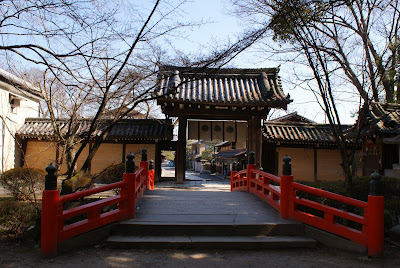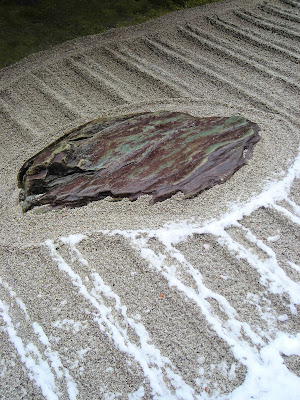3rd March 2010
I ate a lot of mochi recently.
DEMACHI FUTABA (出町ふたば)

Mame mochi: The saltiness of the black beans and a trace of it in the dough balance the sweetness of the bean paste filling. Dough: thick. Filling: lots. Mochi: sumo class. If you like mochi, you'll probably like this. If you don't, this is unlikely to make a convert of you.
Price: 160 yen
Where to find: Futaba is located a little way north of the Kawaramachi-Imadegawa intersection, a five-minute walk west of the Demachiyanagi train station. Mame mochi is also available in the food basements of the Isetan at Kyoto Station and the Takashimaya at Shijo-Kawaramachi.
At Isetan, look for a sign that says ふたば. At Takashimaya, search for a stand with a lot of little wooden plaques on the wall. Each plaque, with the name of a shop in Japanese, indicates that the shop's products are available there. This stand also stocks Daikokuya's kama mochi and lots of other nice things.
The Demachiyanagi shop opens from 8.30 to 17.30. Closed on Tuesdays and the last Wednesday of the month.
Tel: 075-231-1658
DAIKOKUYA (大黒屋)

Kama mochi: Soft, so soft you won't believe it's mochi. And the sweetness of the bean paste so brilliantly controlled that you could eat five in one sitting and not feel ill. I speak from experience.
Price: 210 yen for one but you won't be able to stop at one.
Where to find: Takashimaya's food basement. See above entry. You can try going to the shop itself but prepare to get lost. From the Imadegawa-Teramachi intersection, head north. Keep heading north. You'll see a number of temples on your right. When you find the one with 阿弥陀寺 on a wooden signboard, turn left. Having said that, the calligraphy's fading so look for the stone marker in front of the temple with 織田信長 (Oda Nobunaga) carved into it.
If you see this,

you've found Daikokuya. Open from 8.30 to 20.00. Closed on the first and third Wednesday of the month.

Daikokuya's signboard. The shop name refers to Daikoku, a Japanese god of farming, food and good fortune.
Tel: 075-231-1495
JINBADO (神馬堂)

Yaki mochi: A nice change from the usual smoothness of mochi. The toasted sides give some traction as you chew.
Price: 120 yen
Where to find: Opposite the road from Kamigamo Jinja (shrine). Not to be confused with another yaki mochi shop south of the shrine. It's Jinbado if it looks like this.

Open only in the morning. Closed on Wednesdays.
Tel: 075-781-1377
OFUKUKEN (お婦久軒)


Ume mochi: Other mochi combine sweet and salty; this one adds a dash of sour, presumably from the ume. It leaves a floral fragrance even after the last of it is gone. I've been suspicious of flowers in confectionery after an unhappy experience with a lavender cookie but the ume mochi has restored my faith.

Kanko mochi: Dusted with kinako powder and fairy dust. My memory's a little hazy as to what exactly happened when I bit into this. I believe I took the name of the Lord in vain at one point. This mochi's so soft there's almost zero chew. Did I chew? Surely I just swallowed. The softness pulls away to the roughness of the bean skins in the filling, which swoops into sight of sweetness then veers off. Kyoto restraint at its finest.
The kanko (菅公) mochi was named in honour of Sugawara (菅原) no Michizane, a ninth century official at the Kyoto court who was later deified as a god of learning and is enshrined at Kitano Tenmangu, just opposite the shop. He was said to have loved the ume, which explains the ume mochi at Ofukuken.
Price: Kanko mochi and ume mochi both cost 126 yen each.
Where to find: Ofukuken is across the road from Kitano Tenmangu shrine, along Imadegawa-dori. Look for a woman's face on the noren curtain.

Open from 8.30 to 18.30; closed on Wednesdays.
Tel: 075-461-0974
ICHIWA (一和)

Aburi mochi: There are a few universal taste sensations - sweet, salty, gooey, sticky and burnt crunchy bits. Aburi mochi hits all of them. Maybe this is why it's kept Ichiwa in business for more than a thousand years. Ichiwa isn't the only place that sells aburi mochi - there's a rival teashop just across the road. The secret's in the sauce, said Ichiwa's proprietor. What's in it? I asked. White miso, she answered and refused to say any more.
Price: 500 yen for one serving that includes tea. Takeaway starts from 1,500 yen.
Where to find: Get to Imamiya Jinja (Bus 46 from the Kamigamo Jinja goes there) and go in through the main entrance.

Turn right, cross this bridge and pass through the gateway. If you forget all this, just follow the smell of burning charcoal.

You will find two teahouses outside. Ichiwa - or Ichimonjiyawasuke, to give it its full name - is the one on the left.

You can also tell which one is Ichiwa because it has a pine tree growing through the roof.

The lady of the house grills mochi, smiles and calls out "Okoshiyasu!" - Kyoto's softer version of "Irasshaimase" - to passers-by.

Open from 10.00 to 17.00. Closed on Wednesdays.
Tel: 075-492-6852
...
After all that sugar, the welcome salt of nabeyaki udon at a friendly neighbourhood restaurant. In the bowl, together with the tempura vegetables and the seaweed and the egg lightly cooked, was...

...another mochi.

No comments:
Post a Comment